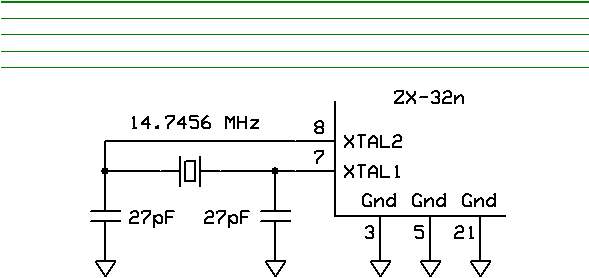
ZBasic Language Reference
208
ZBasic Microcontrollers
Clock Source
The ZX-32n device requires a clock source running at 14.7456MHz while the ZX-32l requires a frequency
of 7.3728MHz. The easiest way to provide this clock source is to connect a crystal of that frequency to
pins 9 and 10 along with the necessary capacitors. Some recommended crystals are shown in the table
below.
Recommended Crystals
Package
ZX-32n
ZX-32l
HC-49/US
ECS-147.4-20-4X (Digi-Key #X1102-ND)
ECS-73-20-4X (Digi-Key #X1084-ND)
HC-49/U
ECS-147.4-20-1X (Digi-Key #X1032-ND)
ECS-73-20-1X (Digi-Key #X978-ND)
Cylinder
ECS-147.4-18-9X (Digi-Key #XC-1382-ND)
ZX-32 Clock Source
If you already have a clock source at the required frequency you can feed that signal directly to pin 8. In
this case there would be no connection to pin 7.
Serial Interface
The ZX-32 device requires a serial interface for downloading code into Program Memory and for your
program’s use via Com1. The recommended serial interface circuitry is shown below. This circuit has
two sub components. The MAX232 chip functions as an RS-232 level converter that translates the 0-5
volt signals of the ZX-32 to the standard RS-232 voltage levels.
The second component is the ATN circuitry that is used to signal the ZX-32 to go into download mode.
The latter circuitry is that portion connected between pin 4 of the DB-9 serial connector and pin 29 of the
ZX-32. You may want to include a jumper in the ATN circuitry so that it can be disconnected when
downloads are not required. With the ATN circuitry connected, the ZX-32 will receive a reset pulse on
every positive transition of pin 4 (DTR) of the serial connector. If alternate component values are chosen
you must ensure that the ZX-32 receives a reset pulse of at least 2uS on every positive transition of the
DTR signal on pin 4 of the serial connector.
One advantage to using this recommended circuit is that the MAX232 chip includes a DC-DC converter
that produces nominally +/- 12V from the 5 volt source. This is particularly useful if your application
requires one or more of these voltages. For example, some LCD devices require a low-current negative
supply for their backlight circuitry. The positive voltage is available on pin 2 of the MAX232 while the
negative voltage is available on pin 6. Consult the datasheet for the MAX232 device for information on
the current capacity of these supplies.